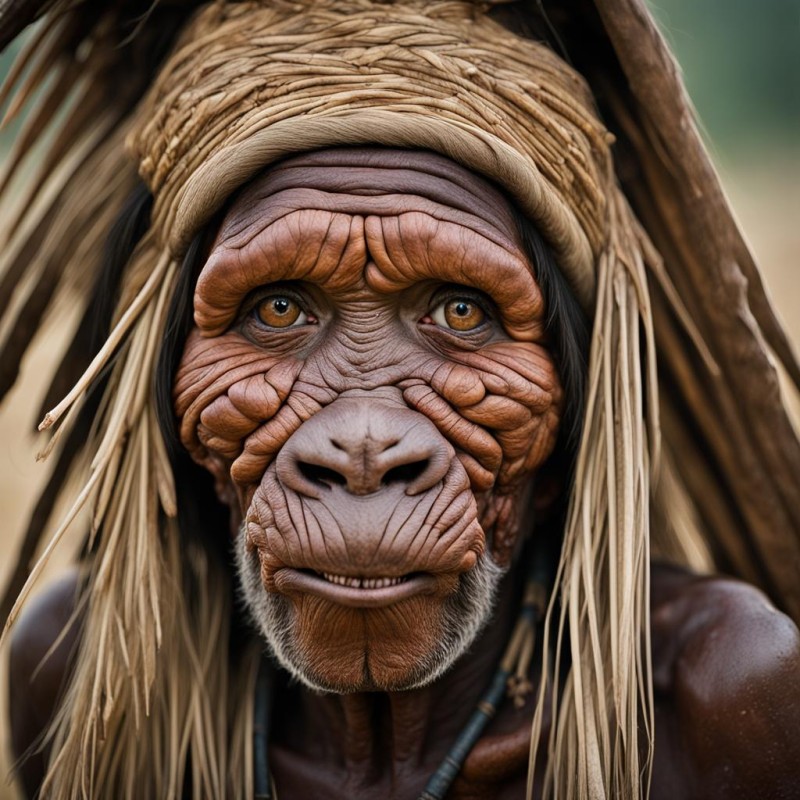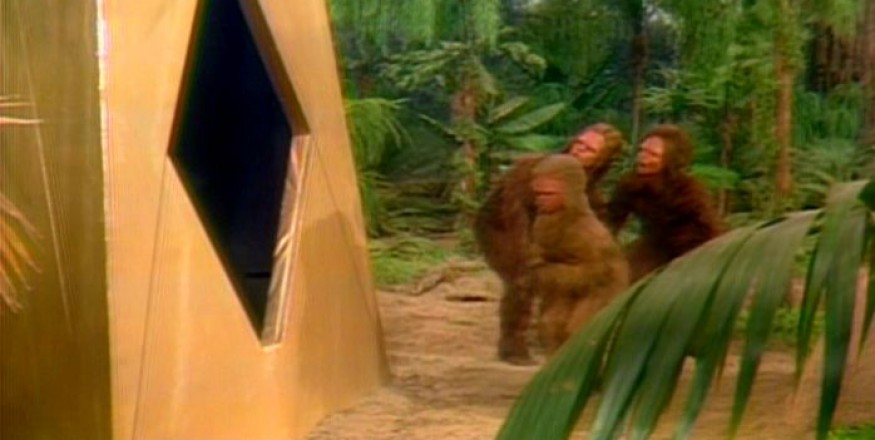 x
x
The drought had lasted now for eleven million years, and the great rock from space had ended the reign of the terrible lizards long ago. Here in the southern hemisphere, in the land that is today Argentina, the battle for existence had reached a new height of ferocity, and the victor had yet to be determined. In this barren and desiccated land, only the small, the swift or the fierce could flourish, or even hope to survive.
The Pakuni, the primitive hominid inhabitants of the pampas, were none of these things, and they were not flourishing. Indeed, they were already far down the road to racial extinction. Fifty of them occupied a group of caves overlooking a small, parched valley, which was divided by a sluggish stream fed from snows in the (Andes) mountains 200 miles to the north. In bad times the stream vanished completely, and the tribe lived in the shadow of thirst.
They were always hungry, and now they were starving. When the first faint glow of dawn crept into the cave, Cha-ka saw that his father had died in the dead of night. He did not know that the old one, Stink, was his father, as such a relationship was utterly beyond the understanding of his species, but as he looked at the emaciated body he felt dim disquiet that was the precursor to sadness.
The two babies were already crying for food, but fell silent when Cha-Ka snarled at them. One of the mothers, defending the infant she could not properly feed, gave him an angry growl in return; he lacked the energy even to cuff her for her presumption.
Now there was sufficient light to leave. Cha-Ka picked up the shriveled corpse and dragged it after him as he bent under the low overhang of the cave. Once outside, he threw the body over his shoulder and stood upright----the only animal in all this world able to do so!
Among the Paku, Cha-Ka was almost a giant. He was nearly five feet high, and though severely underfed weighed nearly 100 pounds. His hairy, muscular body was halfway between man and ape, but his head was already much closer to man than ape. The forehead was edged-out, and his nose was flat, yet he unmistakably held in his genes the promise of humanity. As he looked out upon the hostile world of the Pleistocene, there was already something in his gaze beyond the ability of any Paku. In those dark, childlike eyes was a dawning awareness---the first intimations of an intelligence that could not possibly fulfill itself for ages yet, and might soon be lost forever to history.
There was no sign of danger, so Cha-Ka started to scramble down the almost vertical slope outside the cave, only slightly hindered by his burden. As if they had been waiting for his signal, the rest of the Pakuni emerged from their own homes farther down the rock face, and started to hasten toward the muddy waters of the stream for their morning drink.
Cha-Ka looked across the valley to see if the Others were in sight, but there was no trace of them. Had they not left their caves? Or were they already foraging farther along the hillside? Since they were nowhere to be seen, Cha-Ka forgot them; he was incapable of worrying about more than one thing at a time.
First he must dispose of Stink, but this was a problem that demanded little thought. There had been many deaths this season, one of them in his own cave; he had only to put the corpse where he had left the new baby at the last phase of the moon, and the pumas would do the rest.
They were already waiting, where the little valley fanned out into the savanna, almost as if they had known that he was coming. Cha-Ka left the body under a small bush---all the earlier bones were already gone---and hurried back to rejoin the tribe. He never thought of his father again.
His two mates, the adults from the other caves, and most of the youngsters were foraging among the drought-stunted trees farther up the valley, looking for berries, succulent roots and leaves, and occasional windfalls like small lizards or rodents. Only the babies and the feeblest of the old folk were left in the caves; if there was any surplus food at the end of the day's searching, they might be fed. If not, the pumas would soon be in luck once again.
But this day was a good one---though as Cha-Ka had no real remembrance of the past, he could not compare one time with another. He had found a hive of bees in the stump of a dead tree, and so had enjoyed the finest delicacy that his people could ever know; he still licked his fingers from time to time as he led the group homeward in the late afternoon. Of course, he'd also collected a fair number of strings, but he had barely noticed them. He was now as near to contentment as he was ever likely to be; for although he was still hungry, he was not actually weak with hunger. That was the most to which any Paku could ever aspire.
His contentment vanished when he reached the stream. The Others were there, they were there every day, but that didn't make it any the less annoying.
There were about thirty strong, and were indistinguishable from the members of Cha-Ka's own tribe. As they saw him coming they began to dance, shake their arms, and shriek on their side of the stream, and his own people replied in kind.
And that was all that happened. Though the Pakuni often fought and wrestled one another, their disputes very seldom resulted in serious injuries. Having no claws of fighting canine teeth, and being well protected by hair, they couldn't inflict much harm on each other. In any case, they had little surplus energy for such unproductive behavior; snarling and threatening was a much more efficient way of asserting their points of view.
The skirmish lasted about 5 minutes; then the display died out as quickly as it had begun, and everyone drank his fill of the filthy water. Honor had been satisfied; each group had staked its claim to its own territory. This important business having been settled, the tribe moved off along its side of the river. The nearest worthwhile grazing was now more than a mile from the caves, and they had to share it with a herd of large, antelope-like beasts who barely tolerated their presence. They couldn't be driven away, for they were armed with ferocious daggers on their foreheads....the natural weapons which the Pakuni did not possess.
So Cha-Ka and his companions chewed berries and fruit and leaves and fought off the pangs of hunger while all around them, competing for the same morsels, was a potential source of more food than they could ever hope to eat. Yet the thousands of tons of tasty meat roaming over the pampas and through the bush was not only beyond their reach; it was beyond their imagination. They were slowly starving to death amidst a bounty of food.
The tribe returned to its cave without incident, in the final light of the day. The injured female who had remained behind cooed with pleasure as Cha-Ka gave her the berry-covered branch he'd brought back, and began to attack it ravenously. True, there was little enough nourishment here, but it'd help her to survive until the wound the jaguar had given her had healed, and she could forage for herself again.
Over the valley, a full moon was rising, and a chill wind was blowing down from the Andes. Yes, it would be a very, very cold night - but cold, like hunger, was not a matter for any true concern being merely part of the background of life.
Cha-Ka barely stirred when the shrieks and screams echoed up the slope from one of the lower caves, and he didn't need to hear the occasional growl of the jaguar to know exactly what was happening.
Down there in the darkness old Grumpy and his family were fighting and dying, and the thought that he might help in some way never crossed Cha-Ka's mind. The brutal logic of survival prohibited such fantasies, and not one voice was raised in protest from the listening hillside. Every cave was silent, lest it also court disaster.
The tumult faded away, and presently Cha-Ka could hear the sound of a body being dragged over rocks. It lasted for only a few seconds, until the jaguar got a good hold on its kill. It made no more noises as it padded quietly away, carrying its victim without effort in its jaws.
For a day, maybe two, there would be no further danger here, but there might be other enemies around, taking advantage of this cold Little Sun that shone only at night. Were there only sufficient warning, the smaller predators could sometimes be frightened away by shouts and screams. Cha-Ka crawled out of the cave, clambered onto a big boulder beside the entrance, and squatted there to better survey the valley.
Of all the creatures who had yet walked on Earth, it was the Paku who were the first to look steadfastly at the Moon. Although he could not remember it, when he was very young Cha-Ka would sometimes reach out and try to touch that spectral face rising above the hills.
He had never succeeded, of course, and only now he beginning to understand why. For first, of course, he would have to find a high enough tree to climb.
Sometimes he watched the valley, and sometimes he watched the Moon, but he listened. And listened. Once or twice he nodded off, true, but it was a sleep that came complete with its own hair-trigger alertness, and the slightest sound would have disturbed him. At the ripe old age of 25, he remained in full possession of all his faculties; if his luck continued, and he avoided accidents, disease, predators, and starvation, he might live to be as old as 45!
And night wore on, cold and clear, without further alarms, and the Moon rose slowly amid hemispheric constellations unseen as yet by any human eye. In the caves, between spells of fitful dozing and fearful waking, were being born the nightmares of generations yet to come.
Twice there passed slowly across the sky, rising up to the zenith and descending into the east, in the vicinity of what would someday be Buenos Aires, a dazzling point of light more brilliant than any star.
ns 15.158.61.51da2





















